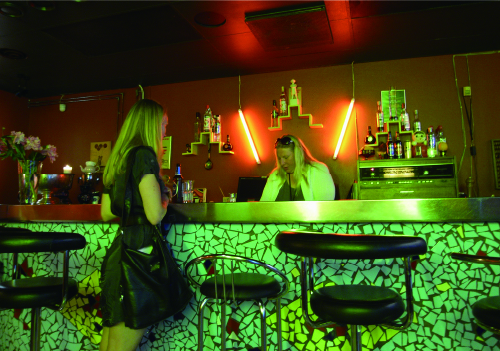前号につづいて映画にまつわる旅の話。ヘルシンキでカウリスマキのBAR「カフェモスクワ」へ行った。
Essay|2024.11.25
Text_Toshinori Okada
Photo_Toshinori Okada
今号の「旅する餃子」がフィンランドだったこともあり、何年か前にヘルシンキへ旅したことを思い出した。そこではまたまた、映画にまつわる場所へ行ったのだった。
大好きな映画監督のひとりにアキ・カウリスマキがいる。「レニングラード・カウボーイズ」や「マッチ工場の少女」、カンヌ国際映画祭のグランプリを受賞した「過去のない男」などで知られるフィンランドの巨匠。
フィンランドといえば北欧デザインで有名な洒落た国。だけどカウリスマキの映画はオシャレとは対極にある、いわゆるダサさが魅力だったりする。常連のマッティ・ペロンパーとカティ・オウティネンには失礼だけど、出演している俳優たちもあか抜けしない。セリフは少なく、画面は暗く、裕福ではない市井の人たちの生活が描かれているものが多い。
ヘルシンキでフィンランドの友人がカウリスマキの店に行かないかと誘ってくれた。もちろん、即答。裏町っぽいあたりをうろろ歩いて着いたのが「カフェモスクワ」というBAR。その名前からしてカウリスマキらしい。
店内はカウンターとちょっとしたテーブル席が4つほど。深い臙脂色の壁面にはマッティ・ペロンパーの写真が飾られている。日本の演歌がかかっていても違和感のない店内は装飾からインテリア、そして空間に充満している空気感にいたるまで、カウリスマキらしさがにじみでている。客は少なく、しんみりとビールを味わった至福の時間が楽しめた。そんな「カフェモスクワ」も残念ながら現在は閉店したという。
日本でヘルシンキのイメージをつくったのは映画「かもめ食堂」だったような気がする。この映画ではイッタラやアラビアの食器などフィンランドらしいデザインのキッチンウェアが多くでてきた。シンプルで、ナチュラルで、ファッショナブルな、雑誌の「クウネル」や「リンカラ」にあるような世界。
もちろん「かもめ食堂」のような雰囲気もヘルシンキにはある。でも一方で、カウリスマキという場末な味わいもある。この両面があって、ヘルシンキは魅力的なんだということはわかっているけど、思い出すのは「カフェモスクワ」のことばかりだったりする。
Following the last issue’s journey through cinema,
I visited Aki Kaurismäki’s bar, Café Moscow, in Helsinki.
This issue’s “Traveling Dumplings” spotlights Finland, bringing back memories of a trip to Helsinki a few years ago—a journey that included another cinematic pilgrimage.
Among my favorite directors is Finland’s Aki Kaurismäki, known for classics like Leningrad Cowboys Go America, The Match Factory Girl, and The Man Without a Past, which won the Grand Prix at Cannes.
Finland may be renowned for chic Scandinavian design, yet Kaurismäki’s films stand in stark contrast, embracing an endearing, almost awkward simplicity. His regulars, Matti Pellonpää and Kati Outinen, along with others, exude a humble, unpolished charm. His films often depict the lives of ordinary, unpretentious people with sparse dialogue and dimly lit scenes.
In Helsinki, a Finnish friend invited me to Kaurismäki’s bar, Café Moscow. Naturally, I agreed without hesitation. After winding through backstreets, we arrived at Café Moscow bar—a name quintessentially Kaurismäki.
The space featured a modest counter and four or so tables, with a photo of Matti Pellonpää gracing a deep burgundy wall. Everything, from the decor to the ambiance, echoed Kaurismäki’s world, where even Japanese enka music wouldn’t feel out of place. With only a few patrons, I savored a quiet beer in bliss. Sadly, Café Moscow has since closed.
For many in Japan, the film Kamome Diner shaped their image of Helsinki, featuring Finland’s iconic Iittala and Arabia kitchenware. That film’s Helsinki was simple, natural, and stylish—like a page from a magazine such as ku:nel or Lingkaran.
Helsinki embodies that charm, but it also has the soulful, gritty character of Kaurismäki’s world. Although I appreciate that it’s this duality that makes Helsinki so attractive, my mind always drifts back to Café Moscow.

「カフェモスクワ」の店内。

壁にはマッティ・ペロンパーの写真。

店内はアキ・カウリスマキの世界。


